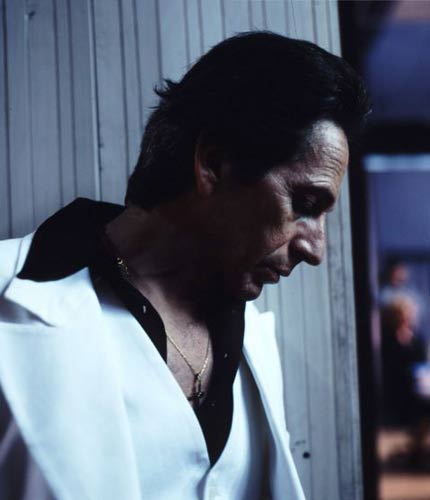Tony Manero (18)
In this bleakly comic drama, Chile under Pinochet's dictatorship is seen through the eyes of an oddball whose obsession with John Travolta in 'Saturday Night Fever' takes a devastating turn

Your support helps us to tell the story
From reproductive rights to climate change to Big Tech, The Independent is on the ground when the story is developing. Whether it's investigating the financials of Elon Musk's pro-Trump PAC or producing our latest documentary, 'The A Word', which shines a light on the American women fighting for reproductive rights, we know how important it is to parse out the facts from the messaging.
At such a critical moment in US history, we need reporters on the ground. Your donation allows us to keep sending journalists to speak to both sides of the story.
The Independent is trusted by Americans across the entire political spectrum. And unlike many other quality news outlets, we choose not to lock Americans out of our reporting and analysis with paywalls. We believe quality journalism should be available to everyone, paid for by those who can afford it.
Your support makes all the difference.People tend to remember the disco era as either cool or corny, but rarely as creepy, let alone laden with political resonance. Suffice it to say that the Chilean film Tony Manero shows you disco delirium as you've never seen it before. Tony Manero, you'll remember, was the protagonist of Saturday Night Fever – the archetypal bridge-and-tunnel kid hitting town at weekends to burgeon as a dancefloor god. Played by John Travolta in his snake-hipped prime, Tony was an authentic working-class icon, embodying the possibility of living the dream.
It turns out that Saturday Night Fever was a big deal in Chile in the late 1970s. You might think that a nation under the yoke of Pinochet's dictatorship had better things to think about than the right moves to "Disco Inferno"', but escapism thrives in hard times. Pablo Larrain's film is set in the Chilean capital Santiago in 1978. Tank detachments patrol the streets; a curfew is in effect and secret police mercilessly suppress opposition: under such circumstances, thinks the film's anti-hero, you should be dancing.
Raul (Alfredo Castro) is a middle-aged man whose life revolves around the disco dream. We first meet him reporting to a TV station to take part in a contest to find Chile's own Tony Manero: his determination is barely dented by the fact that he's turned up a week early and they're taking only Chuck Norris impersonators.
Raul runs a small dance troupe in the run-down café where he also lodges, the other hoofers being his girlfriend, faded vamp Cony (Amparo Noguera), her gauche young daughter Pauli (Paola Lattus), and Goyo (Hector Morales), a young man of dangerous leftist inclinations who looks up to Raul, even though he can knock spots off him on the dancefloor.
Raul doesn't just live the dream; he pursues it with pathological obsessiveness. He's fixated on building an illuminated glass dancefloor, just like in his favourite film: he eventually installs it in his bedroom, which becomes the space for an orgasmic private euphoria. This is the least of his madness: Raul is also, unbeknown to those around him, a very dangerous man. He objects so strongly to finding that Saturday Night Fever has been pulled at the local fleapit and replaced with Grease that he takes it out very personally on the projectionist.
The first glimpse of Raul's violence comes when he suddenly assaults an old woman, the provocation seemingly her approving remark about General Pinochet's blue eyes. Does this mean that Raul is an opponent of the regime? Hardly: he later steals a watch from an anti-Pinochet leafleter left for dead by government heavies. And when his friends find themselves quizzed about their politics, Raul flits off to save his own skin. He may appear to be an apolitical man, but in fact he's the sort of self-serving creature that tends to thrive under tyrannies, when opportunists have ample occasion to backstab with impunity.
Raul might also be seen as a parodic mirror image of Pinochet himself: a tinpot tyrant leading his naive acolytes in a meaningless dance, dazzled by his questionable authority. Raul is antipathetic and manifestly disturbed (you just have to hear him parroting Travolta's screen dialogue like a religious litany), and not even much of a dancer. Yet his obsessive focus dazzles his followers. Impotent and narcissistic, he nevertheless seems to derive a weird sexual pull from his borrowed Travolta mantle: Cony, Pauli and their ferociously right-wing landlady inexplicably have the hots for him. After acquitting himself reasonably in a dance show, Raul even manages to lure a mesmerised Pauli to the bedroom, resulting in a "bad sex" scene to rank with the grisliest.
Director and co-writer Larrain uses downbeat grubby realism to explore a theme at once grotesque and outré, with a streak of corrosive black comedy. Holding it all together is an unnerving lead performance by Alfredo Castro, who looks nothing like Travolta, and a lot like Al Pacino marinaded in embalming fluid. I can recall few screen presences as off-puttingly ratty, but Raul's opaque, tight-lipped sullenness is hideously, inscrutably magnetic.
As much as a commentary on the psychology of cultures under dictatorship, Tony Manero is inescapably readable as an insight into the hollow aspirations engendered in our own times by reality-show culture. Larrain's film is a rich and provocative achievement – but by God, it also makes you worry about those contemporaries of Raul who never got into Saturday Night Fever but were big on Taxi Driver.
Join our commenting forum
Join thought-provoking conversations, follow other Independent readers and see their replies
Comments